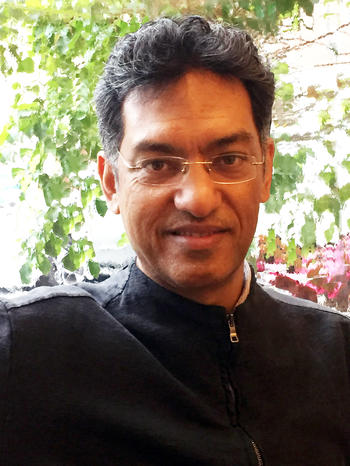Prof. Dr. Viren Murthy

Fellow in the project "A Translingual Conceptual History of Chinese Worlds" (mid-May – mid-August 2023)
Short Biography
Viren Murthy teaches transnational Asian History at the University of Wisconsin-Madison and researches Chinese, Japanese and Indian intellectual history. He is interested in critics of modernity in Asia, specifically, China, Japan and India. He places the history of nationalism and transnationalism in the larger trajectory of global capitalism and examines how pan-Asianists, Third Worldists, Marxists and postcolonialists theorize resistance to imperialism and capitalism and posit a world beyond the present. Central to his work is the politics of the nation-form. Pan-Asianists and Third Worldists believed that the nation-form would be able to combine anti-imperialism with a politics of socialism. He inquires into the conditions for the possibility of such theories in the early postwar period and the ask whether their categories and politics continue to be germane to our neo-liberal present. He is the author of The Political Philosophy of Zhang Taiyan: The Resistance of Consciousness (Brill, 2011) and The Politics of Time in China and Japan, Routledge, 2022). He is co-editor with Prasenjit Duara and Andrew Sartori of A Companion to Global Historical Thought, (Blackwell, 2014), co-editor with Joyce Liu of East Asian Marxisms and Their Trajectories (Routledge, 2017) and co-editor with Max Ward and Fabian Schäfer of Confronting Capital and Empire: Rethinking Kyoto School Philosophy (Brill, 2017). He has published articles in Modern Intellectual History, Modern China, Frontiers of History in China and Positions: Asia Critique, Jewish Social Studies, Critical Historical Studies, Journal of Labor and Society. His book, entitled: Pan-Asianism and the Legacy of the Chinese Revolution, is scheduled to appear in October, 2023 with University of Chicago Press.
Project
Rethinking Modern China from a Global Perspective: The Translingual Worlds of Kyoto SchoolsWith the rise of China today, there has been a renewed interest in a genealogical study of how China entered the modern world. This has involved a confrontation with Hegel and his idea of history as a linear progression. However, scholars have often failed to notice how in early twentieth century Japan, sinologists and philosophers were rethinking the significance of China and the world from what I would call a sublated Hegelian perspective. Hegel used the term “sublation (Aufhebung)” to explain how a concept loses its immediacy and becomes part of a larger process. In this manner, the said concept is both superseded and preserved. Japanese sinologists sublated Hegel’s vision of history as a progression from the Orient to Europe in different ways and I will begin this project by focusing on the approach of two Kyoto Schools. Even apart from the usual difficulties associated with determining the contours of any school of thought, the “Kyoto School” has been referentially opaque; sinologists take it to refer to the Kyoto School of sinology and Japanologists usually associate the term with the Kyoto School of philosophy. Interestingly, the two Kyoto Schools were active during roughly the same period, namely the interwar and postwar periods but scholarship on the two have generally remained separate. However, I contend that the two schools overlap in their attempt to re-imagine the world against Eurocentrism and the Kyoto school of sinology explicitly connect such a new world to sublation of China in East Asian culture. Both Kyoto School sought to provincialize Europe and during the interwar period, such a provincializing mission was connected the ideology of Japanese empire. However, this project of reimagining the world continues in different forms in Japanese sinology in the 1980s and in certain aspects of political theory from the 1990s to the present.
This project begins by examining work of the Kyoto School sinologist, Naitō Konan (1866-1934) and the Kyoto School philosopher, Koyama Iwao (1905-1993). In the 1920s and 1930s, Naitō Konan wrote a number of popular essays loosely categorized around the theme “East Asian Cultural History”, which sought to rethink Japan’s role in the world through China. In the early 1940s, Koyama Iwao similarly constructs a project pluralizing world-history, this time explicitly engaging Hegel. Because of this explicit engagement of Hegel, Koyama provides us a window to examine how Hegel’s philosophy of world history was translated into a a new context and then sublated and pluralized. Koyama’s philosophy of World History was influential during the war and was part of a project to “overcome modernity.” Such calls to overcome the west using quasi-Hegelian maneuvers have recently moved from Japan to China, where scholars such as Wang Hui and Zhao Tingyang, each attempt to rethink the world from the perspective of Chinese history and philosophy. Such a project poses not only the question of the historical and contemporary significance of East Asian attempts to imagine the world, but also the more philosophical question about the significance of Hegel’s philosophy of history.
